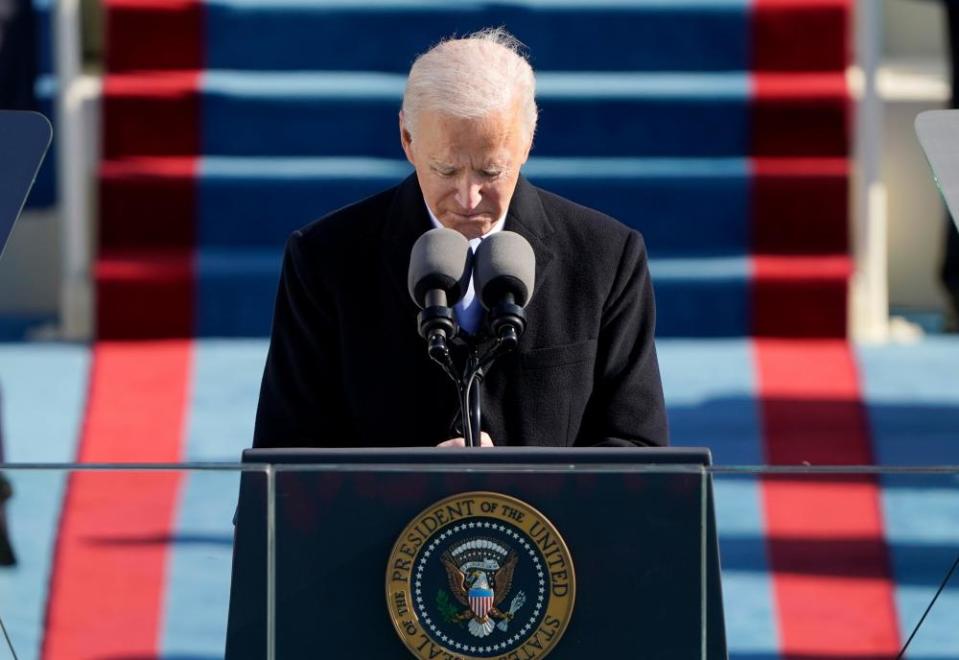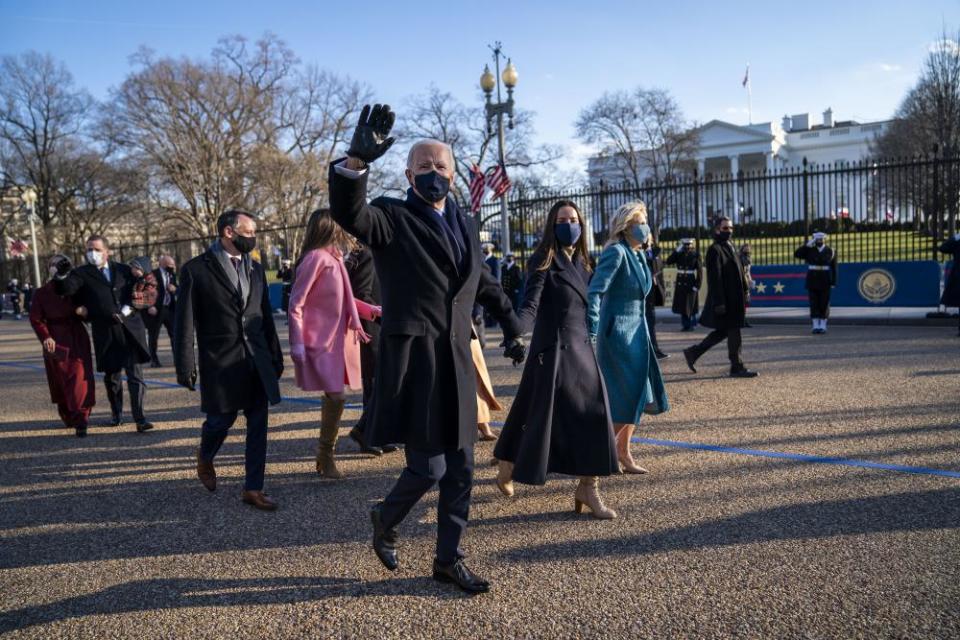Biden offers a message of resilience in America's 'winter of peril'

Once a dashing young senator, now a lion in winter, Joe Biden walked up the presidential lectern he could finally call his own after half a century of striving.
The message that the 46th US president wanted to send a pained nation was the one that has defined his own life in the face of incalculable personal and political loss: resilience.
Related: Trump tells Americans 'have a good life' as he leaves White House for final time
“We will press forward with speed and urgency, for we have much to do in this winter of peril and possibility,” Biden told the audience at the US Capitol in Washington on Wednesday, as the sun finally broke through clouds that had brought fleeting snow. “Much to repair. Much to restore. Much to heal. Much to build. And much to gain.”
That winter of peril includes a raging pandemic that has killed more than 400,000 Americans and a fraying body politic: two weeks after a mob encouraged by Donald Trump sacked the Capitol, this could no longer be described as a peaceful transfer of power.
Now it is Biden’s great misfortune to have realised, at 78 years old, a lifetime ambition at a moment of what he called “the cascading crises of our era”. It is also his good fortune to have no alternative but to think big and aim high. The quintessentially moderate, middle-of-the-road candidate might go down as radical and transformational because that is what the moment demands.
Just before noon, the oldest US president ever elected was sworn in on a 19th-century Bible: five inches thick with a Celtic cross the cover, it has been in his family since 1893. It was also used by his late son, Beau Biden, when he was sworn in as attorney general of Delaware in 2007. Biden, wearing a navy suit and navy overcoat, both by the designer Ralph Lauren, turned to kiss his wife, Jill, in an ocean blue wool tweed coat, and the sun shone.
Against the backdrop of a heavily fortified Washington, this was a strangely calm and serene inauguration in the eye of a national storm. The public had been urged to stay away because of the pandemic and then forced to do so by a ring of steel and 25,000 national guard troops following the insurrection at the US Capitol two weeks earlier.
Instead of thousands of people crowding elbow to elbow, the Capitol lawn was dotted with hundreds of physically distanced guests, TV crews and portable toilet cubicles but otherwise yawned empty. Beyond the Ulysses S Grant Memorial, a giant statue of the former general and president on horseback, the mall offered the beautiful sight of thousands of flags representing those who could not be here.
It meant the politicians, judges and performers on the main platform were like actors performing in the dead air of a near empty theatre. Star turns – Lady Gaga singing the national anthem into a gold microphone – that would once have evoked raucous cheers were greeted with polite applause. The oddity of it all was compounded by the sight of former presidents and first ladies wearing face masks.
Bill and Hillary Clinton took their place first beneath the Capitol dome, topped by the monumental Statue of Freedom, and west front bedecked in red, white and blue. They were followed by George and Laura Bush, then Barack and Michelle Obama. Vice-President Mike Pence and his wife, Karen, emerged to a particularly cold gust of wind. The tableau’s message was unmissable: the political establishment had reasserted itself, the old order was restored.
Trump, the first president in a century and a half to snub his successor’s inauguration, had bolted to his luxury estate in Florida earlier in the day. In a “departure ceremony” at Joint Base Andrews in Maryland, he told supporters: “So, just a goodbye. We love you. We will be back in some form.” Perhaps inevitably, he departed to the strains of Frank Sinatra’s My Way.
A man who hates being called a 'loser' more than anything has been replaced by a man who knows loss in his bones
In some ways it felt like Trump’s presidency ended the day he was banned by Twitter in the wake of the Capitol riots, a penalty that may have stung more than being impeached for the second time by a House of Representatives he little understood.
Even so, at the moment he officially became a former president on Wednesday, it was as if a great weight had been lifted off millions of shoulders, as if the miasma of lies and outrages had been exorcised at last. As they realised Trump will no longer live inside their heads day and night, the collective exhale was almost audible.
A man who hates being called a “loser” more than anything has been replaced by a man who knows loss in his bones. That current of empathy made Biden the right candidate at the right time.
But 74 million people did vote for Trump. Polls suggest that a majority of them do not regard Biden as a legitimate president. In austere remarks, he noted that “democracy has prevailed” but acknowledged that none of the looming crises – pandemic, economy, racial justice, climate – can be tackled in a nation at war with itself.
“The answer is not to turn inward, to retreat into competing factions, distrusting those who don’t look like you, or worship like you do, or don’t get their news from the same sources you do,” Biden said. “We must end this uncivil war that pits red versus blue. Rural versus urban. Conservative versus liberal. We can do this if we open our souls, instead of harden our hearts.”
Related: ‘An inspiration to us all’: Amanda Gorman's inaugural poem stirs hope and awe
It had taken four years but Biden’s speech was a rebuttal of Trump’s at the same spot four years before. For one thing, he pledged allegiance to truth: “We must reject the culture in which facts themselves are manipulated and even manufactured.”
He added: “Recent weeks and months have taught us a painful lesson. There is truth and there are lies, lies told for power and for profit. And each of us has a duty and a responsibility as citizens, as Americans, and especially as leaders, leaders who have pledged to honor our constitution and protect our nation, to defend the truth and defeat the lies.”
Elected with the help of African American voters, and after a summer in which Black Lives Matter protests convulsed the nation, Biden also embraced the cause of equality. “A cry for racial justice some 400 years in the making moves us. The dream of justice for all will be deferred no longer,” he said, describing “a rise in political extremism, white supremacy, domestic terrorism that we must confront and we will defeat”.
Minutes earlier, Kamala Harris had been sworn in as the first woman, first African American and first Asian American vice-president. It was a moment that resonated in the small crowd, through social media and around the world. After the Trump era, dominated by white men, the administration will look like America again.
Biden said: “Don’t tell me things can’t change.”
The message was underlined, and the show nearly stolen, by the 22-year-old national youth poet laureate, Amanda Gorman. She recited: “The new dawn blooms as we free it, for there is always light if only we’re brave enough to see it, if only we’re brave enough to be it.”
Biden, Clinton, Bush and Obama moved on to the Tomb of the Unknown Soldier at Arlington National Cemetery, maintaining the solemn tone and show of unity. Later the new president arrived at the White House, walking hand in hand with Jill and followed by family members.

Reporters shouted out “Mr President!”, which must have been a sweet sound. Suddenly he ran over to a couple of them and gave them fist bumps; he also walked over to greet children, a spring in his step. The Bidens then walked up the White House driveway, pausing to wave to photographers.
Biden knows this place well, having served as vice-president for eight years. Once, he stood alongside Obama to announce he would not run as a candidate for president in 2016 – at that moment, it seemed his ambitions had been extinguished.
The past four years have been compared to a Shakespearean tragedy: a mad king, a plague, a tragic climax that may now produce catharsis. Jeffrey Wilson, a lecturer at Harvard University and author of the book Shakespeare and Trump, said he had heard echoes of Richard III, with Biden emerging as his successor, Henry VII, at end of the play.
“Richard III has been, for the majority of the play, absolutely energetic, captivating, fascinating, just a shot of adrenaline that we get wrapped up in,” he said. “And then what happens is you get to the end of that play and you realise that the boring, good government of Henry VII is so much better than the exhilarating tyranny of Richard III.
“Richard III ends with the dawning of a new day and this new leader is not fun or inspiring – he’s pious and boring – but he represents a return to order and we can all go back to our lives, back to our barbecues without this constant conversation about the evil plaguing national politics.”

 money
money 